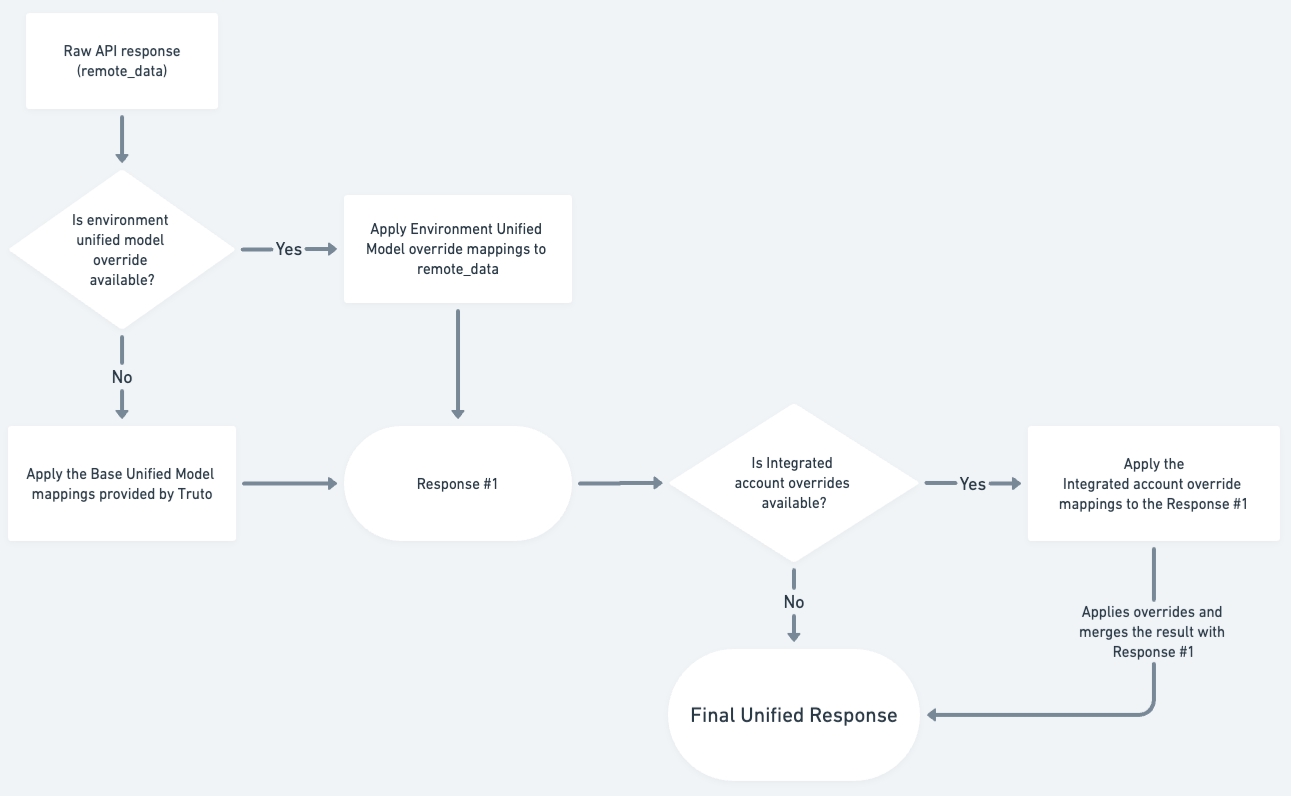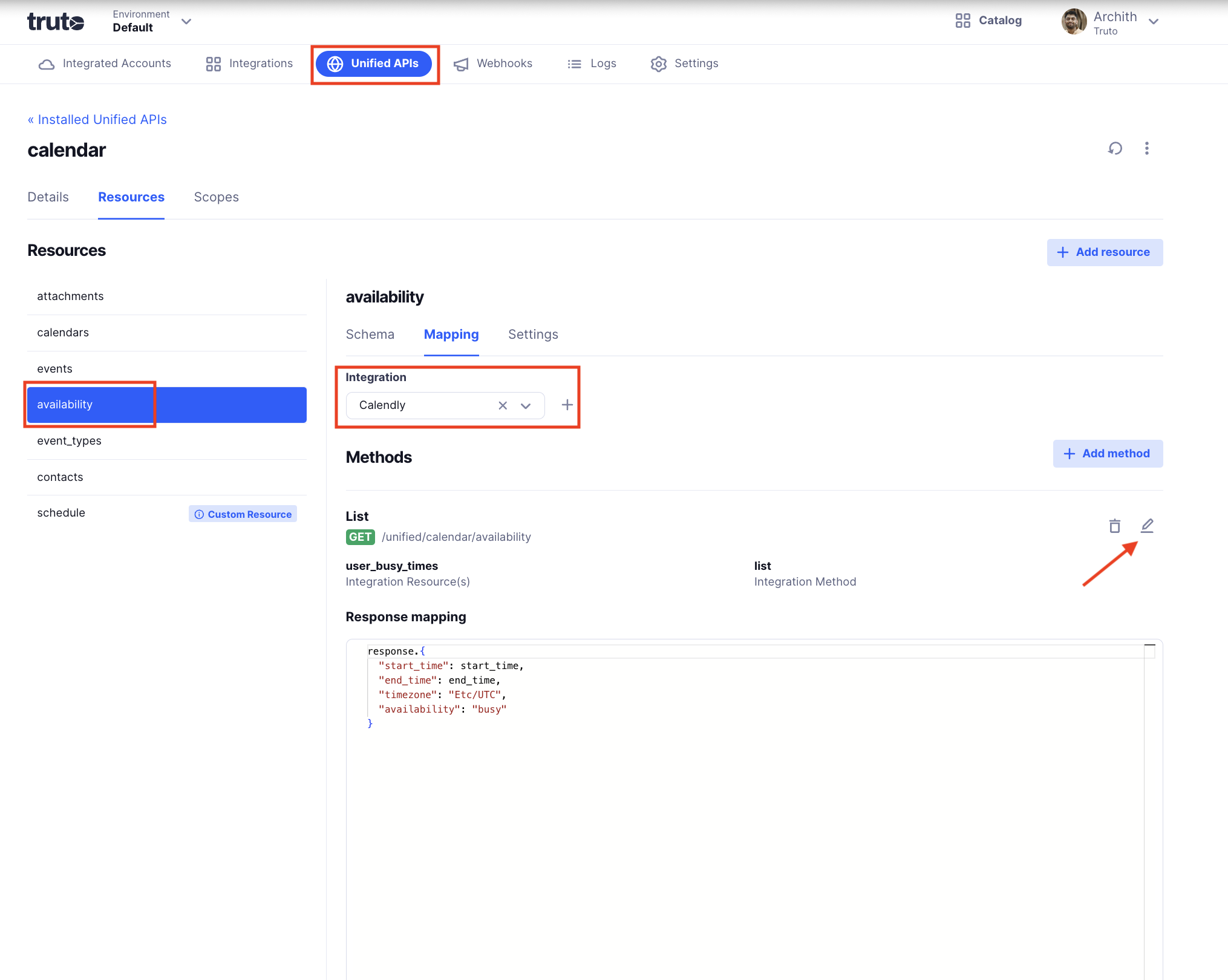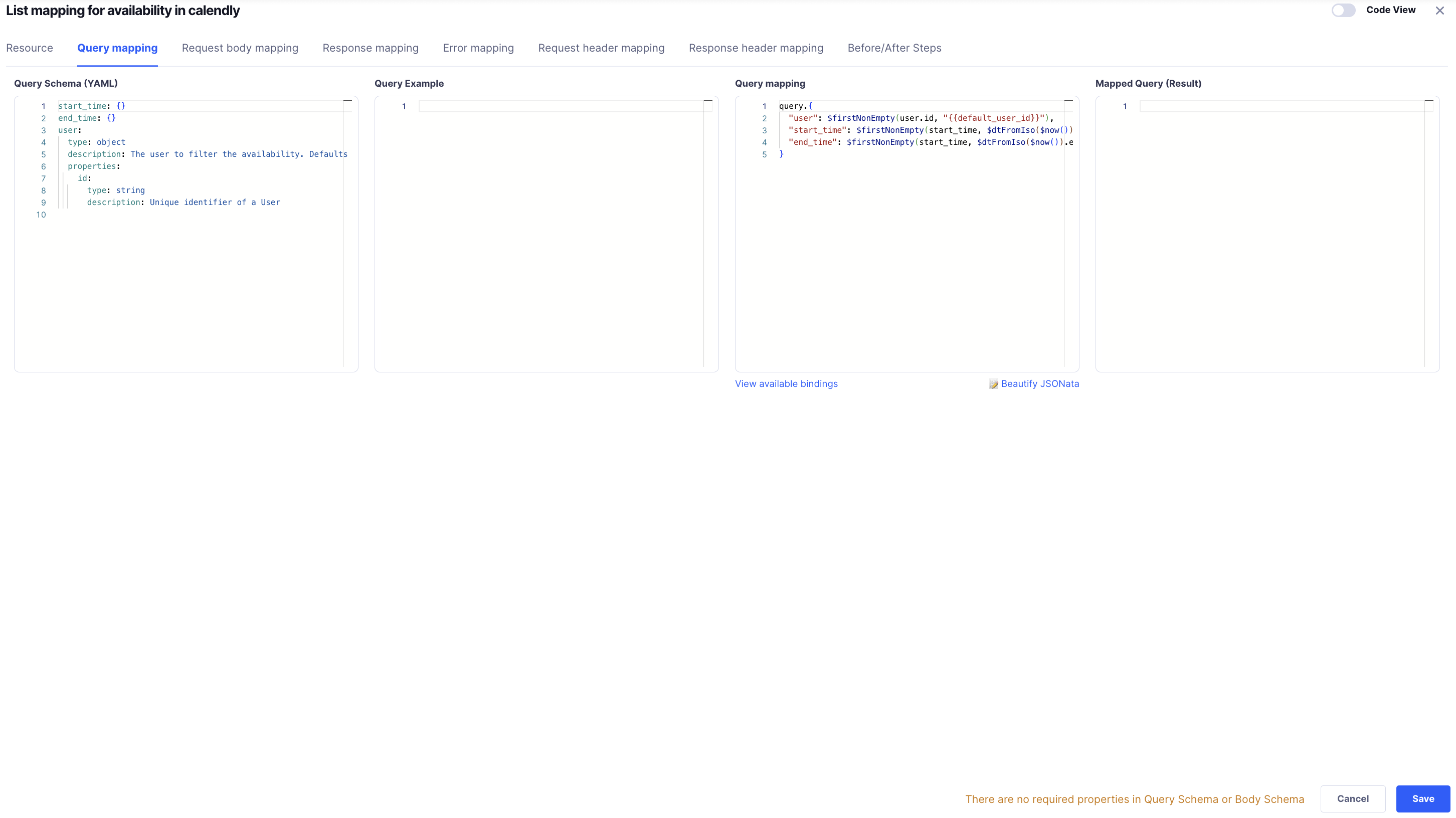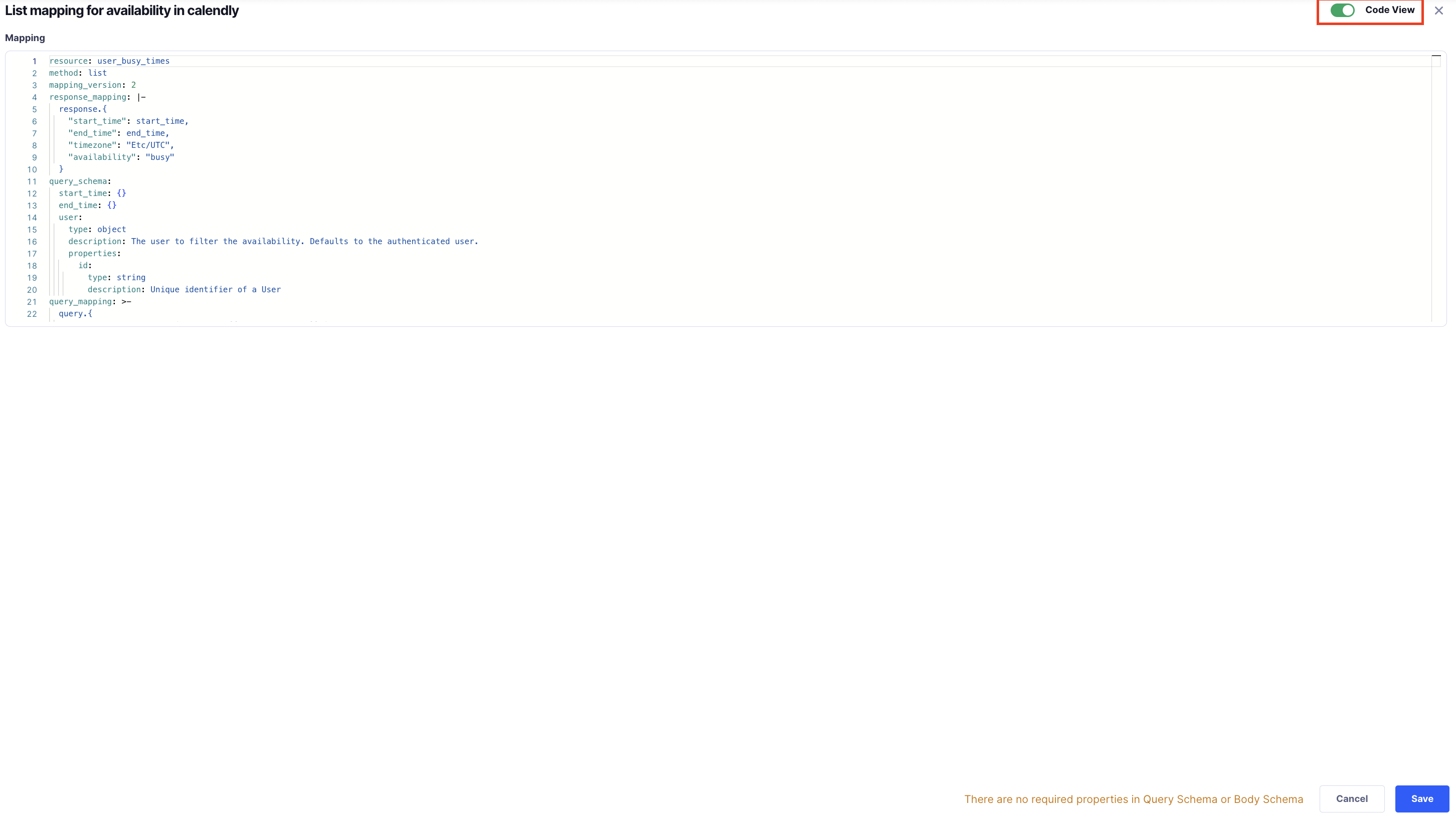Overriding Unified API mappings
To support use cases where some of your customers might be using a specific custom fields for a resource, you can override the Unified API mappings on an Integrated account level (applies to only that specified integrated account) or Environment level (applies to multiples integrated accounts in that environment). This will allow you to map the custom fields to the Unified API fields.
How overrides are applied
Overrides only need to specify the mappings that you need to change or add or remove.
- Truto applies the environment unified mapping overrides if available or base mapping from the Unified API to the raw API response (
remote_data). - Overrides from the integrated account are applied to the same
remote_data. - If there are any attributes returned from Step 2 which are also returned from Step 1, then they are overwritten. Any new attributes from Step 3 are added to the unified API response.

How to specify an override for an Integrated account
Let's take an example of HiBob, where we want to specify an override to get the date_of_birth for an employee and adding a query_param name.
To do this,
- Get the integrated account ID from the UI or the API where you want to apply the override.
- Make a PATCH request on the integrated account resource with the override details.
For the example mentioned before, you'll have to make the following API request,
curl --location --request PATCH 'https://api.truto.one/integrated-account/<integrated_account_id>' \
--header 'Content-Type: application/json' \
--header 'Authorization: Bearer <your_api_key>' \
--data '{
"unified_model_override": {
"hris": {
"employees": {
"list": {
"query_mapping": "{ \"fullName\": query.name }",
"response_mapping": "{ \"date_of_birth\": response.personal.shortBirthDate }"
}
}
}
}
}'The request body contains the following,
unified_model_overrideThis is the object which specifies the overrideshrisThis is the name of the Unified Model. You can find this on the Unified Model details page in the UI.employeesThis is the resource you want to specify the override for.listThe overridden methodquery_mappingSince we want to add query_paramnameto filter the results based on the name input, we specify thequery_mappingwhich is a JSONata expression.nameis mapped to the query parameterfullNamewhich is accepted by the HiBob API.response_mappingSince we want to change the response, we specify theresponse_mappingwhich is a JSONata expression. Theremote_datais present inresponseobject within the JSONata expression.
Now you can go ahead and make the LIST /unified/hris/employees API request for the integrated account and it should return you the data with date_of_birth added to it.
How to specify an override for an Environment
Overriding Unified API mappings in Truto allows you to customize how data is translated between your systems and the Unified API. Follow these steps to override and adjust API mappings according to your environment and requirements:
1. Navigate to the Unified API Mapping
- Go to the Installed Unified API section in your Truto dashboard.
- Locate and select the Mapping tab.
- From the list of available integrations, choose the one you want to modify.
- Identify the specific API method you wish to override and click on the pencil icon next to it.

2. Open the Mapping Modal
Clicking the pencil icon opens a modal window containing various mapping configurations. Inside this modal, you will see separate sections for:
- Query Mapping
- Request Body Mapping
- Response Mapping
- Error Mapping
- Request Header Mapping
- Response Header Mapping

Alterntaively, you can edit the mappings altogether by toggling the Code view. It opens up a YAML configuration that looks like -

3. Modify and Override the Mappings
- Change the Mappings:
- Delete Fields: Remove any fields that are not relevant to your integration needs.
- Add Extra Fields: Insert new fields or parameters as necessary to tailor the request, response, headers, or error handling.
- Modify Existing Fields: Adjust the field structure, data types, or
JSONatatransformation logic to align with your specific use case.
How to specify an override for an Environment thorough API
Let's take an example of HiBob, where we want to specify an override to get the date_of_birth for an employee.
To do this,
- Get the installed unified model ID by specifying the name of unified_model in the following API request
curl --location 'https://api.truto.one/environment-unified-model?unified_model.name=<unified_model_name>' \
--header 'Content-Type: application/json' \
--header 'Authorization: Bearer <your_api_key>'- Make a PATCH request on the installed unified model resource with the override details.
For the example mentioned before, you'll have to make the following API request,
curl --location --request PATCH 'https://api.truto.one/environment-unified-model/<installed_unified_model_id>' \
--header 'Content-Type: application/json' \
--header 'Authorization: Bearer <your_api_key>' \
--data '{
"override": {
"resources": {
"employees": {
"integration_mapping": {
"hibob": {
"list": {
"query_mapping": "{ \"fullName\": query.name }",
"response_mapping": "{ \"date_of_birth\": response.personal.shortBirthDate }"
}
}
}
}
}
}
}'The request body contains the following,
overrideThis is the object which specifies the overridesresourcesThis is the object which specifies the overrides for multiple resources.employeesThis is the resource you want to specify the overrides for.integration_mappingSince we want to add the overrides for integration, we specifyintegration_mappingwhich is an object.hibobThis is the integration name you want to specify the overrides for.listThe overridden methodquery_mappingSince we want to add query_paramnameto filter the results based on the name input, we specify thequery_mappingwhich is a JSONata expression.nameis mapped to the query parameterfullNamewhich is accepted by the HiBob API.response_mappingSince we want to change the response, we specify theresponse_mappingwhich is a JSONata expression. Theremote_datais present inresponseobject within the JSONata expression.
Now you can go ahead and make the LIST /unified/hris/employees API request for the integrated accounts in the environment and it should return you the data with date_of_birth added to it for all of the integrated accounts in the specified environment.
Bindings available to use in response_mappings
Bindings are the data that are sent in the Unified API call, which can be used in response_mappings to apply overrides as per your needs.
responseThis is the raw API response returned by the API call.
{
"response": {
"personal": {
"shortBirthDate": "1990-01-01"
}
}
}rawQueryThis is the object that contains the raw query parameters sent in the Unified API request.
{
"fullName": rawQuery.name
}queryThis is the object which specified the query params after mapping is applied as needed by the integration.
{
"fullName": query.name
}INFO
Consider an example of query_mapping where the contact resource is mapped to person_id in the following way -
{
"person_id": rawQuery.contact.id
}Now, if you need to map the contact resource in the response_mapping, you can do in the following ways -
{
"contact": {
"id": query.person_id
}
}or
{
"contact": {
"id": rawQuery.contact.id
}
}bodyThis is the object that contains the body sent in the Unified API request.
{
"fullName": body.name
}contextThis is the object that contains all the variables stored in your Integrated account.
{
"fullName": context.name
}Read more about Bindings
Available JSONata bindings in mappings
JSONata methods are lifesavers while writing overrides for transforming the raw API response to the Unified API response schema. You can refer to Truto JSONata to know more about the methods supported.

